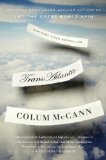Summary | Excerpt | Reading Guide | Reviews | Beyond the Book | Readalikes | Genres & Themes | Author Bio

A Novel
by Colum McCann1919
c l o u d s h a d o w
IT WAS A MODIFIED BOMBER. A VICKERS VIMY. ALL WOOD AND LINEN and wire. She was wide and lumbering, but Alcock still thought her a nippy little thing. He patted her each time he climbed onboard and slid into the cockpit beside Brown. One smooth motion of his body. Hand on the throttle, feet on the rudder bar, he could already feel himself aloft.
What he liked most of all was rising up over the clouds and then flying in clean sunlight. He could lean out over the edge and see the shadow shift on the whiteness below, expanding and contracting on the surface of the clouds.
Brown, the navigator, was more reserved—it embarrassed him to make such a fuss. He sat forward in the cockpit, keen on what clues the machine might give. He knew how to intuit the shape of the wind, yet he put his faith in what he could actually touch: the compasses, the charts, the spirit level tucked down at his feet.
IT WAS THAT time of the century when the idea of a gentleman had almost become myth. The Great War had concussed the world. The unbearable news of sixteen million deaths rolled off the great metal drums of the newspapers. Europe was a crucible of bones.
Alcock had piloted air-service fighters. Small bombs fell away from the undercarriage of his plane. A sudden lightness to the machine. A kick upwards into the night. He leaned out from his open cockpit and watched the mushroom of smoke rise below. His plane leveled out and turned towards home. At times like that, Alcock craved anonymity. He flew in the dark, his plane open to the stars. Then an airfield would appear below, the razor wire illuminated like the altar of a strange church.
Brown had flown reconnaissance. He had a knack for the mathematics of flight. He could turn any sky into a series of numbers. Even on the ground he went on calculating, figuring out new ways to guide his planes home.
BOTH MEN KNEW exactly what it meant to be shot down. The Turks caught Jack Alcock on a long-range bombing raid over Suvla Bay and pierced the plane with machine-gun fire, knocked off his port propeller. He and his two crewmen ditched at sea, swam to shore. They were marched naked to where the Turks had set up rows of little wooden cages for prisoners of war. Open to the weather. There was a Welshman beside him who had a map of the constellations, so Alcock practiced his navigation skills, stuck out under the nailheaded Turkish night: just one glance at the sky and he could tell exactly what time it was. Yet what Alcock wanted more than anything was to tinker with an engine. When he was moved to a detention camp in Kedos, he swapped his Red Cross chocolate for a dynamo, traded his shampoo for tractor parts, built a row of makeshift fans out of scrap wire, bamboo, bolts, batteries.
Teddy Brown, too, had become a prisoner of war, forced to land in France while out on photographic reconnaissance. A bullet shattered his leg. Another ruptured the fuel tank. On the way down he threw out his camera, tore up his charts, scattered the pieces. He and his pilot slid their B.E.2c into a muddy wheatfield, cut the engine, held their hands up. The enemy came running out of the forest to drag them from the wreck. Brown could smell petrol leaking from the tanks. One of the Krauts had a lit cigarette in his lips. Brown was known for his reserve. Excuse me, he called out, but the German kept coming forward, the cigarette flaring. Nein, nein. A little cloud of smoke came from the German's mouth. Brown's pilot finally lifted his arms and roared: For fucksake, stop!
The German paused in midstride, tilted his head back, paused, swallowed the burning cigarette, ran towards the airmen again. It was something that made Brown's son, Buster, laugh when he heard the story just before he, too, went to war, twenty years later. Excuse me. Nein, nein. As if the German had only the flap-end of his shirt sticking out, or had somehow neglected to tie his shoelace properly.
Excerpted from TransAtlantic by Colum McCann. Copyright © 2013 by Colum McCann. Excerpted by permission of Random House, a division of Random House, Inc. All rights reserved. No part of this excerpt may be reproduced or reprinted without permission in writing from the publisher.
Your guide toexceptional books
BookBrowse seeks out and recommends the best in contemporary fiction and nonfiction—books that not only engage and entertain but also deepen our understanding of ourselves and the world around us.